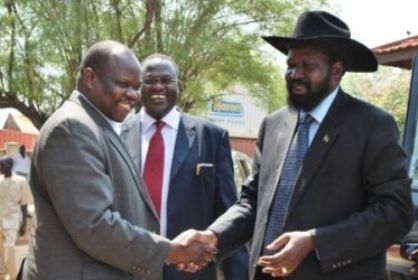S. Sudan’s Amum, Machar accused of “deliberately” causing SPLM failures
November 25, 2013 (JUBA) – Senior members of South Sudan’s ruling party (SPLM) have backed president Salva Kiir’s decision to dissolve the structures of the party, blaming officials who recently fell out with the system for allegedly failing it.

Machar was sacked on 23 July from the vice-presidency position, ending his eight-year tenure as the country’s second most powerful man.
A senior official, who wished to remain anonymous, told Sudan Tribune on Monday that Machar and Amum “deliberately caused this confusion and the institutional weaknesses we are seeing today”.
The official, himself a member of the recently dissolved SPLM Political Bureau (PB), said that Amum “had not shown institutional respect” to Kiir who took over the party’s chairmanship in 2005 after the death of its former leader, John Garang.
The rift in the SPLM has seen the political allegiances formed during the civil war with Sudan return to the surface.
“Amum still has the mentality of undermining him (Kiir) as happened during [the civil] war when some commanders and comrades would report directly to comrade John Garang without following [the SPLA’s] administrative chain of command, even though they knew comrade Salva [Kiir] was the direct deputy commander-in-chief”, he said.
The official, who spoke exclusively to Sudan Tribune, also referred to Machar’s split from the mainstream SPLM/SPLA led by Kiir and Garang in 1991.
Machar rejoined the movement ahead of the January 2005 peace deal with Khartoum that led to independence in 2011, with Kiir later appointing him as his vice-president.
“As for comrade Riek Machar, history bears witness. He does not like to be under the leadership of someone else”, the official said, adding that both Amum and Machar “have different interests and ambitions” which motivated their actions.
Over the weekend, Kiir chaired a meeting of senior SPLM officials to discuss the process of creating the party’s new structures. Notably absent from the meeting were Machar, Amum and several other figures sacked in the July cabinet reshuffle.
According to the official, the SPLM leadership “agreed in principle” to form new party structures, which will be carefully scrutinised by “highly respected and committed” SPLM members who have a “clear and clean record”.
Mark Nyipuoc, deputy speaker of South Sudan’s national legislative assembly, said those who claimed that the SPLM had lost its direction and vision should explain why they had not acted to avoid these perceived failures.
“What prevented those who say the SPLM had lost vision and direction from acting to avert this? Who prevented them from taking corrective measures? I think these are the questions which you in the media should be asking”, Nyipuoc told Sudan Tribune on Monday.
AMUM’S SUSPENSION NOT ENOUGH
Meanwhile, Sabrino Majok Majok, a member of the party’s National Liberation Council in South Sudan’s Northern Bahr el Ghazal state, accused Amum of “deliberately” masterminding the current pitfalls facing the party.
“Given what we know, Comrade Pagan is the prime cause of all [the] internal problems SPLM is facing today. His suspension is not enough. He should be held accountable for deliberately trying to destroy this peoples’ party which liberated [the] people of South Sudan from oppressors, for his individual’s interests”, Majok wrote in a comment article circulated to various news entities on Sunday.
“Comrade Pagan was the weakest link in the SPLM party, period”, he said.
POLITICAL SABOTAGE
Majok’s view was echoed by Lual Bol Kuan, a spokesperson for the South Sudanese business community, who asserted that the political crisis is discouraging international investment.
“We are all stakeholders in this country. This is why we are not silent. The current political situation was created by individuals who do not know their actions would create an atmosphere not favourable for investment and trade”, Kuan told Sudan Tribune.
He claimed that the former vice-president “worked hard to undermine” president Kiir’s authority with the hope that the former would eventually resign, allowing him to take over the party leadership.
“The former vice-president should have played a key role in managing internal challenges [rather] than resorting [to] political sabotage and negative public criticism of the chairman. The intention behind this was to portray the president as someone incompetent to the run the affairs of the country”, Kuan said.
Therefore, public criticism was not just a tactic to undermine Kiir’s authority, but was a weapon used to push him to eventually resign, he added.
In the weeks before he was sacked, Machar became increasingly critical of the government’s performance and openly put himself forward to succeed Kiir as the SPLM chairman and the country’s president.
Kuan claimed that the conduct of the former vice-president was a clear violation of the SPLM constitution and member’s code of conduct.
Following the dissolution of the SPLM’s structures was confirmed last week, Machar accused Kiir of paralysing the party.
(ST)
